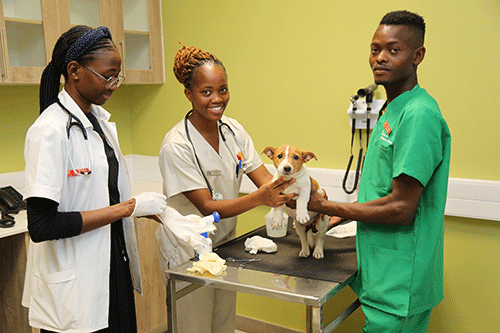Higher education minister Itah Kandjii-Murangi said the inauguration of the University of Namibia’s Small Animal Academic Hospital emphasises the need to have professionally trained veterinary officials as they safeguard the beef and tourism industry and animal welfare among others.
The university yesterday officially launched the centre that will serve as an education hub and offer services to members of the community who have limited or no access to veterinary services.
The centre will specifically cater to small animals while the larger ones will be accommodated at the Neudamm Campus which spreads over 10 187 hectares and is about 30km east of Windhoek on the Hosea Kutako International Airport and Gobabis road.
Kandjii-Murangi said: “The general responsibility of veterinary officials is detection and investigation, prevention, controlling and surveillance of diseases.”
She added that Namibia used to send students abroad for studies, mainly to South Africa but the narrative has been changed where the country is now in a position to train prospective animal health practitioners in medicinal fields, including Allied Health Sciences, engineering and pharmacy.
“Unfortunately, these disciplines are critical in the development of any nation and thus we have noticed that over the years, it became very difficult to get places in these fields of study,” recalled Kandjii-Murangi.
To prospective students and animal health enthusiasts, Unam’s admission to the six-year fully-fledged Bachelor of Veterinary Medicine Programme requires 30 points from five subjects including a “B” symbol in English, Biology, Mathematics, and Physical Science (or Chemistry) at NSSC Ordinary Level or a three grade or higher in Mathematics and Physical Science (or Chemistry) at NSSC Higher Level.
While inaugurating the hospital, Unam chancellor Nangolo Mbumba said Unam has embraced “One Health” by integrating the School of Veterinary Medicine into the Faculty of Health Science, which traditionally housed disciplines, related to human health only.
“The agricultural sector contributes significantly to the country’s GDP with a considerable portion derived from livestock and wildlife. To effectively promote animal welfare, manage diseases, and maintain animal health requires a well-trained cohort of veterinarians,” he said.
The hospital will be serving outpatients including the Namibian Police K9, SPCA and the public. “It will specifically serve members of the community who have limited or no access to veterinary services. It also incorporates the Unam Mobile Animal Clinic that provides veterinary services to remote areas of the country,” stated Mbumba.
The hospital has been in a pilot phase where animal health specialists vaccinated and sterilised 13 000 dogs, cats and donkeys belonging to various members of the community. Hence the student train and specialise in surgical, clinical skills and diagnostic imaging using small various animals, mostly dogs under the supervision of a lecturer.
Mbumba noted that since its inception, the Unam School of Veterinary Medicine has so far trained 51 veterinarians who have been already rendering services locally, in Botswana and South Africa.
Vice chancellor Kenneth Matengu agrees and appreciates the progress made with the veterinary sector in the country, further concurring that Namibia’s progression stands a greater chance of being measured based on how it treats its animals.
“Animals are not just things that we look after but they also contribute to our wellness by being companions and other forms in which they help us,” he said.
Matengu noted: “Due to the complexity and technical requirements, veterinary medicine is one of the most challenging programmes at any tertiary institution. One thing I can tell you is that it is very expensive, but it is an expense we must spend on.”
– psiririka@nepc.com.na


